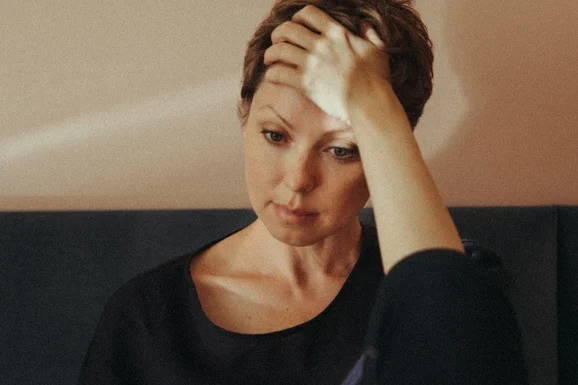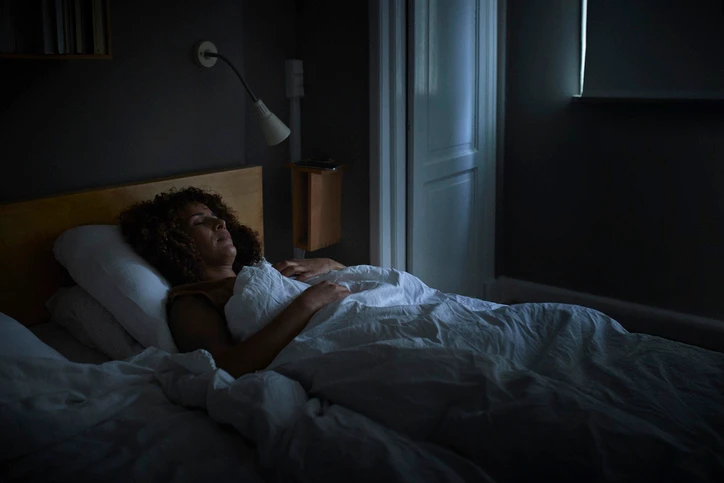
Summary
Menopause fatigue is a persistent feeling of exhaustion commonly experienced by women during perimenopause and menopause, often triggered by fluctuating hormone levels such as estrogen and progesterone. Contributing factors include sleep disturbances from hot flashes, anxiety, and other menopause symptoms, as well as lifestyle habits like poor sleep hygiene, diet, alcohol, and caffeine use. Management strategies focus on regular exercise, healthy eating, stress reduction, and, in some cases, hormone replacement therapy (HRT), while ruling out other medical causes of fatigue is essential.
One of the most insulting things about going through menopause is that each menopausal symptom seems to feed off the other.
That deflated balloon feeling that can hit you while you’re running errands, minding your own beeswax — when suddenly you get hit with a wave of exhaustion that sends you into another world?
It’s called menopause fatigue and it can occur all on its own or as a direct result of other menopause symptoms.
What Is Menopause Fatigue?
Like nearly everything related to menopause, we start with your hormone levels. During perimenopause, your hormones are in flux: estrogen production slows and your progesterone production vacillates —both of which can directly affect your energy levels.
Studies have shown that too much progesterone can cause chronic fatigue, and there’s evidence too that hormones produced by the adrenal gland can have an effect on your energy levels, too.
But hormone levels are not the only culprit. Menopause fatigue can also be caused by a perfect storm of symptoms: Sleep problems caused by hot flashes, anxiety, a sensitive bladder — any other number of symptoms that come part and parcel with menopause can give you a hangover-like feeling of fatigue as well.
What Can I Do About Menopause Fatigue?
Before you climb back under the covers — not that we’re against that — consider these lifestyle changes that are energy-saving and energizing tactics to beat menopause fatigue.
Eat right and exercise regularly
Moving your body always increases your energy levels, not to mention regulates blood sugar and your insulin levels. A 2015 study of postmenopausal women found recommended amounts of moderate to vigorous physical activity per day to be associated with higher amounts of energy and physical function.

Aim for 30 to 60 minutes of moving your body at a decent clip. Avoid sugar crashes by staying away from the carby sweets you might really be craving and sub them out with omega-3 rich foods (like salmon) and antioxidant-rich foods, like blueberries.
Practice good sleep hygiene
Hot flashes and hormonal imbalance can really mess with your ability to get consistent shuteye. To give yourself the best shot at a good night’s sleep, dial back your bedtime and do whatever it takes to create a comfy, relaxing atmosphere in your sleep space, and keep your phone away from your bed — the blue light can mess with your circadian rhythms by keeping the sleep-inducing hormone called melatonin from flowing the way it needs to, keeping you awake longer than you intend to be.

Keep a cold, low lit bedroom
Hot flashes can come on out of nowhere, even in the middle of the night, throwing your whole night’s sleep off-kilter. Keeping your bedroom to a cool 65 or so degrees will help keep your hot flashes from being so disruptive. Sleeping in a colder bedroom also helps to keep the sleep-inducing melatonin flowing, keeps the stress hormone cortisol lower (higher levels can cause weight gain), and keeps certain types of insomnia at bay.
Turn the lights low and try reading before bed instead of staring at a screen. If you need to fall asleep to a TV show, use an actual TV instead of your computer — some newer models have a blue light filter that you can turn on. It’s not ideal, but it helps.
Avoid alcohol
According to the Sleep Foundation, alcohol depresses your central nervous system, slowing brain activity. Even though that can make you sleepy, drinking a lot of alcohol has been long linked to messed up sleep quality and it can exacerbate sleep disorders like sleep apnea. It disturbs your quantity and quality of restorative REM sleep, so you dream less, and can cause sleep disturbance as your body works to metabolize it. Avoid alcohol, or cut down by nursing a single drink during happy hour, to keep booze from causing further sleep disturbance.
Manage your stress
As mentioned above, poor sleep can cause the stress hormone cortisol to rise, contributing to weight gain and giving you an overall edgy feeling. Adding meditation and exercise to your daily routine can help manage stress, or reading a book before bed instead of doom-scrolling, will contribute to a better night’s sleep and help get your menopause fatigue under control.

Avoid overdoing the caffeine
When you’re suffering from menopause fatigue it’s really tempting to caffeinate the day away; however, more than one or two cups and you risk contributing to the vicious circle of sleep deprivation. Have your first cup then downshift to herbal teas or water for a better night’s sleep. If you smoke, nicotine is a stimulant and well known to do more harm than good with respect to your health in general.
As for the impact of supplements, the jury’s still out. Yes, there are tons of menopause supplements on the market that are said to help ease various menopause symptoms — like black cohosh, flaxseed, valerian, and plant estrogens that are supposed to mimic estrogen, like wild yam and red clover — but researchers don’t know yet whether they help with menopause fatigue.
What Else Could It Be?
It’s so easy to blame menopause for things that feel off to a middle-aged woman (and lots of health practitioners even do this) but lots of health issues can cause fatigue, like autoimmune disorders, cardiovascular disease, thyroid disease, liver disease, kidney issues and diabetes. Talk to your doctor and see if you can rule any of these other issues out just to be sure, and devise a treatment plan.
Hopefully, it won’t be long before these tips will help set you off to a good night’s slumber. If your menopause symptoms are intense enough for you to lose sleep for a long time or otherwise disrupt your life, some doctors will (barring a history of cancer) prescribe Hormone Replacement Therapy, or HRT, to get you through the worst phase of your bothersome symptoms.
Need help finding a health care practitioner to talk to about your menopause fatigue — and your menopause symptoms? Alloy can help.
Alloy's Recommended Treatment for Hot Flashes and Night Sweats
Sources:
Noreika, Donatas et al. “Progesterone and mental rotation task: is there any effect?.” BioMed research international vol. 2014 (2014): 741758. doi:10.1155/2014/741758
McConnell, Daniel S et al. “Menopausal transition stage-specific changes in circulating adrenal androgens.” Menopause (New York, N.Y.) vol. 19,6 (2012): 658-63. doi:10.1097/gme.0b013e31823fe274
Ward-Ritacco, Christie L et al. “Feelings of energy are associated with physical activity and sleep quality, but not adiposity, in middle-aged postmenopausal women.” Menopause (New York, N.Y.) vol. 22,3 (2015): 304-11. doi:10.1097/GME.0000000000000315
Ward-Ritacco, Christie L et al. “Adiposity, physical activity, and muscle quality are independently related to physical function performance in middle-aged postmenopausal women.” Menopause (New York, N.Y.) vol. 21,10 (2014): 1114-21. doi:10.1097/GME.0000000000000225
"Blue light has a dark side". Harvard Health. https://www.health.harvard.edu/staying-healthy/blue-light-has-a-dark-side
Okamoto-Mizuno, Kazue, and Koh Mizuno. “Effects of thermal environment on sleep and circadian rhythm.” Journal of physiological anthropology vol. 31,1 14. 31 May. 2012, doi:10.1186/1880-6805-31-14
Alice Park. "Tip for Insomniacs: Cool Your Head to Fall Asleep". Time. Jun 17, 2011. https://www.healthland.time.com/2011/06/17/tip-for-insomniacs-cool-your-head-to-fall-asleep/
Related Content
Citations
Daniel S McConnell, Frank Z Stanczyk, Maryfran R Sowers, John F Randolph, Bill L Lasley. Menopausal transition stage-specific changes in circulating adrenal androgens. Menopause 2012;19(6):658-63. PMID:22415570.
View sourceChristie L Ward-Ritacco, Amanda L Adrian, Patrick J O'Connor, Jessica A Binkowski, Laura Q Rogers, Mary Ann Johnson, et al.. Feelings of energy are associated with physical activity and sleep quality, but not adiposity, in middle-aged postmenopausal women. Menopause 2015;22(3):304-11. PMID:25137245.
View sourceChristie L Ward-Ritacco, Amanda L Adrian, Mary Ann Johnson, Laura Q Rogers, Ellen M Evans. Adiposity, physical activity, and muscle quality are independently related to physical function performance in middle-aged postmenopausal women. Menopause 2014;21(10):1114-21. PMID:24618768.
View sourceR Leproult, G Copinschi, O Buxton, E Van Cauter. Sleep loss results in an elevation of cortisol levels the next evening. Sleep 1997;20(10):865-70. PMID:9415946.
View sourceNoreika, Griškova-Bulanova, Alaburda, Baranauskas, Grikšienė. Progesterone and Mental Rotation Task: Is There Any Effect?. BioMed Research International 2014;2014. doi:10.1155/2014/741758. PMC:PMC4004113.
View sourceOkamoto-Mizuno, Mizuno. Effects of thermal environment on sleep and circadian rhythm. Journal of Physiological Anthropology 2012;31(1):14-14. doi:10.1186/1880-6805-31-14. PMC:PMC3427038.
View source
Subscribe
Go ahead, you deserve to
feel fantastic
By subscribing you agree to our Terms of Service & Privacy Policy.